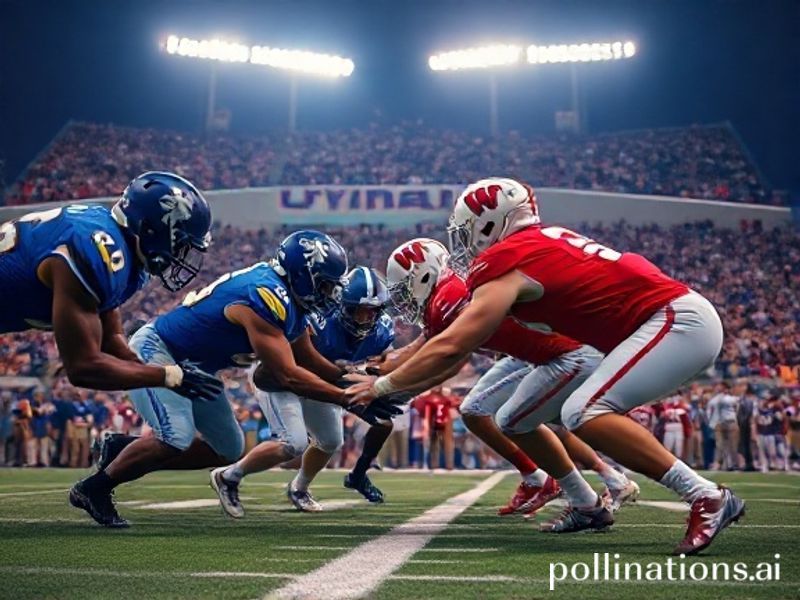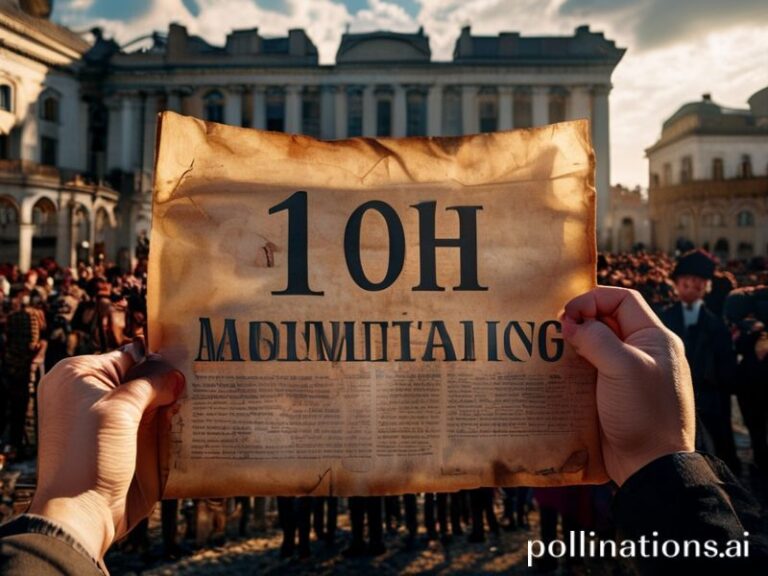Middle Tennessee vs Wisconsin: The Tiny Football Game Explaining Our Entire Broken World
Middle Tennessee vs Wisconsin: A Microscopic Proxy War for a Planet That Can’t Even
By the time the final whistle blows in Murfreesboro this Saturday, roughly 97 % of humanity will be blissfully unaware that Middle Tennessee and Wisconsin just re-enacted the global balance of power in 60 tidy minutes of American football. That’s fine; ignorance is the planet’s most renewable resource. But for those of us condemned to watch, the game is a perfect miniature of the civilizational squabble currently unfolding from Kyiv to Kinshasa: a scrappy, under-resourced fringe versus a bloated behemoth that still thinks size guarantees destiny.
Wisconsin arrives the way G-7 finance ministers descend on an African debt-relief summit: shoulder pads the size of Alpine glaciers, budget lines fat enough to fund a mid-sized navy, and a fan base whose combined cholesterol could plug the Suez—again. Middle Tennessee, meanwhile, is the IMF’s worst nightmare: creative, cash-strapped, and dangerously convinced it can win on ingenuity alone. Sound familiar? One side prints money; the other prints hope. Only one of those currencies is hyper-inflating.
Global supply-chain nerds will note the logistical poetry: Wisconsin’s offensive line averages 6-foot-5 and 320 pounds—roughly the same specifications as a standard shipping container, except the containers move faster through U.S. ports. Middle Tennessee’s front seven, on the other hand, is assembled from the same just-in-time spare parts currently clogging every harbor from Rotterdam to Busan. If the Blue Raiders manage a sack, it will be the most efficient international delivery all weekend.
Bookmakers list Wisconsin as a 17-point favorite, which is exactly how the IMF handicaps any Global South proposal that includes the words “debt” and “forgiveness” in the same sentence. The spread is less about football and more about actuarial comfort: big-brand programs, like big-brand nations, are assumed to absorb shocks better. They have reserves, swap lines, and a compliant media ready to label any stumble a “recalibration.” When Middle Tennessee stumbles, it’s a systemic risk.
Meanwhile, the broadcast will beam into 180 countries via whatever streaming service hasn’t been sanctioned this week. Viewers in Jakarta will see Wisconsin’s marching band spell out “Dairy Pride” and wonder why a state that produces 3 % of the world’s cheese needs that much self-affirmation. Lagos living-room economists will clock the Badgers’ third-string running back earning, per carry, more than Nigeria’s median annual income. Somewhere in Geneva, a WTO intern will accidentally cite the game’s Nielsen ratings as evidence of U.S. agricultural subsidies.
Climate watchers can’t help but admire the carbon choreography: Wisconsin’s equipment truck drove 600 miles south, burning diesel that would have been better used powering emergency generators in Karachi. Middle Tennessee countered by flying its kicker in from Australia, because apparently global talent pipelines are only controversial when they involve fruit pickers, not field-goal specialists. If the stadium lights flicker, that’s just the grid politely asking whether we’ve considered not turning night into day for amateur gladiators.
And yet, the contest offers a sliver of redemption. Should the Blue Raiders pull the upset—should the algorithmic gods finally pity Davids over Goliaths—expect ESPN to package the highlight reel as proof that “anything is possible.” Translation: the house always wins, but occasionally it lets a minnow swim upstream for content. International viewers will recognize the trope from every World Bank slideshow that showcases a single Kenyan start-up as evidence that structural adjustment works.
When the clock hits zero, Wisconsin will still be Wisconsin: large, lactose-tolerant, and pre-approved for another line of credit. Middle Tennessee will still be Middle Tennessee: scrappy, inventive, and one blown ACL away from austerity. The rest of us will return to our respective currency crises, proxy wars, and heatwaves, comforted by the knowledge that somewhere in America, unpaid college students just settled the world order for three hours on artificial turf. The planet spins on, slightly dizzier than before.







